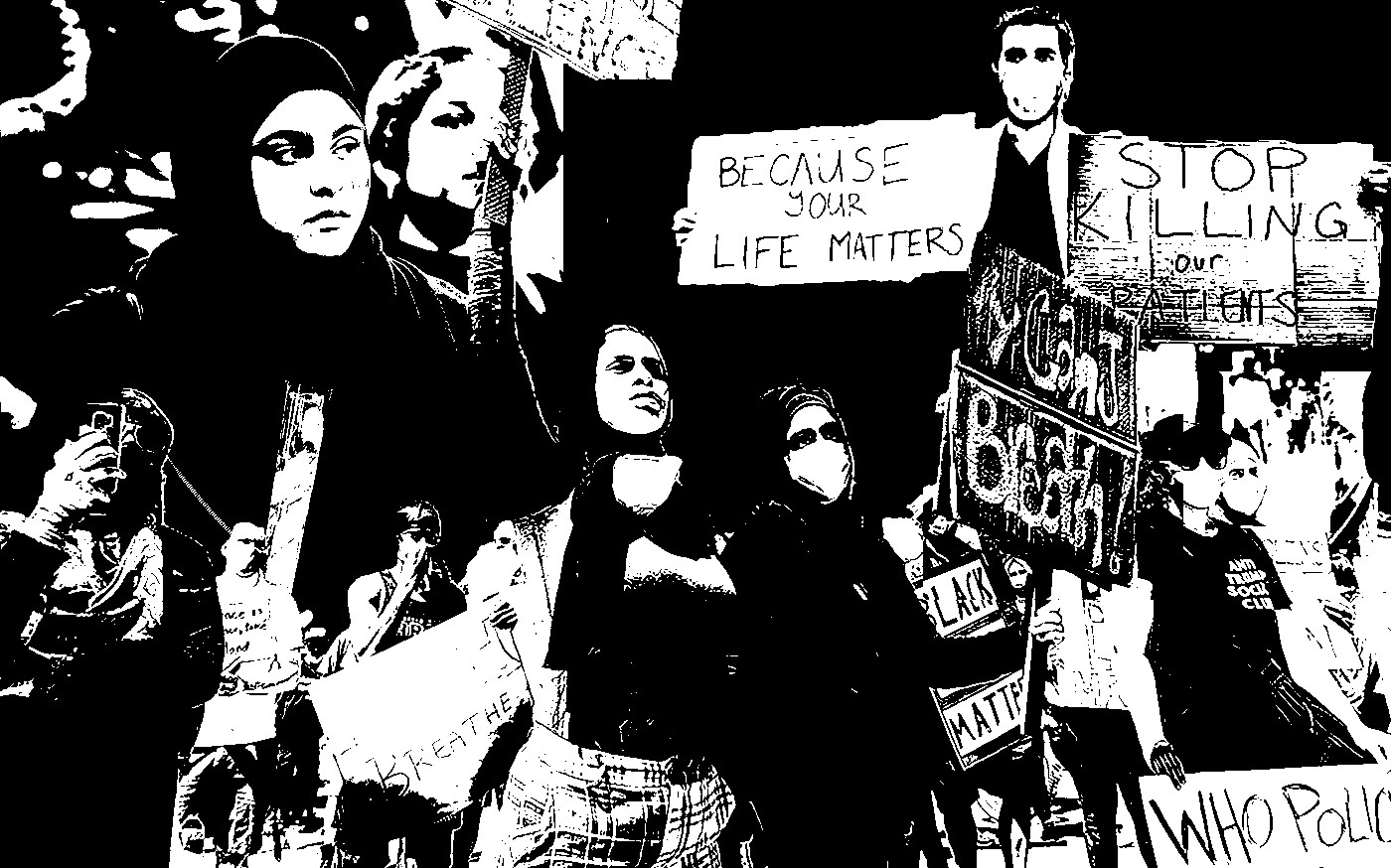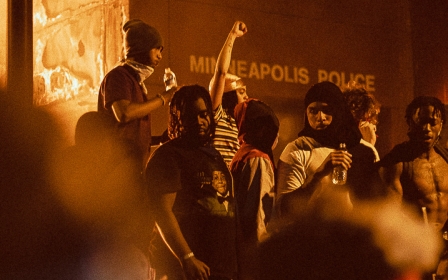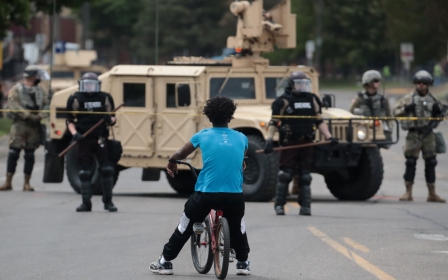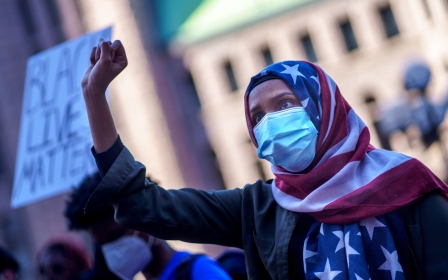Meet the Arab Americans taking to the streets to support Black Lives Matter

Perhaps it was the gruesome nature of his death or maybe it was the reasons leading to his arrest; what is certain is that George Floyd's killing will forever be remembered as a major turning point in the renewed fight for racial justice.
Since Floyd's death in late May, when a white police officer knelt on his neck for eight minutes and 46 seconds, America's streets have been teeming with rage against racism and police brutality.
Demonstrations have gripped all 50 states, bringing together people from all segments of American society. Many Arabs and Muslims who are no strangers to activism themselves have joined the ongoing protest movement demanding justice for Floyd and an end to systemic racism.
The recent events have also caused Arab and Muslim communities to look inward, sparking initiatives to eradicate racism from within and improve relations with African Americans.
While activists stress that African Americans have their unique struggles and challenges, many have drawn parallels between atrocities committed and supported by the American government overseas and racial injustices at home.
New MEE newsletter: Jerusalem Dispatch
Sign up to get the latest insights and analysis on Israel-Palestine, alongside Turkey Unpacked and other MEE newsletters
"What we have to do is recognise that the funeral of George Floyd, where tears are flowing... they have [similar] funerals in the West Bank because of US policy [and] US bombs mediated through [the] Israel Defense Forces," prominent African-American intellectual Cornel West told Middle East Eye last week.
To examine the phenomenon of Arab Americans joining Black Lives Matter protests, MEE features several demonstrators who share their experiences in their own words:
Taher Herzallah, 30, Palestinian American, Washington DC
I have attended around six protests so far. I feel that as a Muslim American, and as a Palestinian American, I needed to show up where it was needed most, instead of spending time on Facebook, putting [up] a black Facebook profile picture. I wanted to actually be on the ground, putting myself between Black bodies and police, making sure that we were making the best use of our youth and our health to help our brothers and sisters in this moment.
Right now is the time to institute structural change. And I want to make sure that our community is a part of that because this will be registered in history. This is a moment that will be remembered. And if our community is sitting back, arguing against protests and rioters and looting, rather than stepping up and being on the ground, then I feel like that's going to be a problem. I don't want that to be the registered memory, I want it to be something else.
As a Palestinian, if I'm walking on the streets in any neighbourhood in my country, there's a potential for me to be targeted by the police or the military. This is something that is a definite parallel with Black people here in this country.
We have a lot to learn as a Palestinian people from the Black struggle in America, as the Black struggle learnt from the Palestinian liberation movement back in the 60s. It's important for us to also connect the parallels of liberation struggles. The Black Panther Party and Malcolm X were meeting with Palestinian leaders and travelling to the region to engage in these discussions. And I think historically speaking this is a beautiful part of that. We have a history. I'm not doing anything new by participating in these protests, per se. I'm actually just continuing that tradition of solidarity between our two communities and our two struggles.
Ahmed Amer, 31, Egyptian American, Brooklyn, New York
I spent my high school years in post-9/11 America, and I remember what it was like to be vilified on the news day and night, and not have anyone stand up and fight for me or my family.
We are all American citizens. I cannot count the amount of times I was harassed and intimidated by airport security and customs agents solely because of my name or birthplace.
So when I see what is happening around us now, it is impossible not to see the injustice, not to get involved. If you can’t stand up for those who are most oppressed in this society, then you won’t stand a chance yourself.
As an American citizen, I am fortunate enough to be able to go out and protest without risk of deportation or losing a visa. A lot of doctors in the US are on visas and they can't participate out of legitimate fear, so those of us who can must do so. As Arab Americans we know what it is like when someone tries to paint you negatively and attempts to take away your identity and limit your freedom.
In the Middle East and North Africa, there is historical racism towards sub-Saharan Africans and South Asians. Naturally, those who came from the MENA region to the US brought with them some of these biases and prejudices, so this is something that we need to work on.
And some might think that police brutality and racism doesn’t affect us, or have anything to do with us. But it does. And it is time to stick up for our Black brothers and sisters.
Lubna Morrar, Palestinian American, Oakland, California
Born and raised in Oakland, California, My family comes from a Palestinian background. My father is from Jerusalem and my mother is from Venezuela. I grew surrounded by revolutionary Palestinian politics. I also grew up in a predominantly Black and brown society where a lot of my friends and people that I knew had family members who were part of the Black Panther Party or other left nationalist organizations. So this really shaped my internationalist perspective at a very young age, even though I didn't necessarily have the terminology for it.
My education at San Fransisco State University and organizing with the Palestinian Youth Movement (PYM) and the General Union of Palestinian Students (GUPS) shaped and developed that part of my political identity that I didn't know existed on the larger scale of internationalism.
As a Palestinian, who doesn't know how to read and write in Arabic, my natural gravitation to understanding my struggle came Black literature and Black intellectuals - people like Frantz Fanon, Malcolm X, Kwame Ture, Angela Davis, Bell Hooks, Robert F Williams and the list goes on. It helped me understand the conditions and situation in Oakland, connecting it to my larger understanding of the Palestinian struggle.
The first movement I was a part of was when Israel was bombing Gaza with Operation Cast Lead for 22 days on December 27th, 2008, and on the 5th day, which was January 1st, 2009, the day of my birthday, Oscar Grant was a 22-year-old Black man that was killed by the BART police in Oakland in 2009. That moment hit different for me, what was happening back home in Palestine was not different than what was happening in my hometown of Oakland.
As the protests took place all over the Bay Area, Palestinians were carrying posters of Oscar Grant and Black folks were carrying Palestinian flags. it was the first time I saw posters on the BART platforms all over the Bay that said "From Gaza-to-Oakland". It spoke to me as someone who grew up in Oakland and it garnered an internationalist identity of our struggles. It was the first time I came across some of the terminology that is being used so commonly today - like "militarized police forces" and "US police officers being trained in Israel".
This way we see how these systems are harvesting anti-Black racism globally, we also have to see the direction of racial capitalism as being the pivotal tool to do it. And to understand why systemic policing needs to be abolished, it also needs to go hand-in-hand in dismantling the prison industrial complex, and being able to shed light on our political prisoners. Whether they are in the occupied territories of Oakland, or inside of occupied Palestine today.
As Muslims, we are taught three things about social justice: it is our duty be a part of these political projects, it's our duty to fight for a more just society, and it is our duty to combat oppressive regimes globally. Liberation of one people means a liberation of all peoples. Free the land, free Palestine.
Diana El Ghali, 16, Lebanese American, Queens, New York
I have been to two protests so far in NYC. I decided to protest because far too many innocent Black lives have been taken over the past couple of years. Myself and millions of other Americans have had enough of police brutality against innocent people of colour.
They do nothing wrong, yet they are being treated unequally just because of their skin colour. They are killed and handcuffed and beaten.
It impacts me because I am also a person of colour; I, too, have been stereotyped and called names because I'm Arab and Muslim. Many harsh words have been said to me because of that.
I may not be Black, and I understand that I will never fully understand, but I stand to let people know. I can't just sit here and watch white police officers kill people because of the colour of their skin. I also have many Black friends, and it hurts me to think that they too could be a victim of this.
I have witnessed police brutality in my neighbourhood. I've seen young Black teens around my age just biking around, and the cops just stopping to ask questions just because they are Black and therefore "suspicious". I have seen white cops force handcuffs on them without any reason, which was awful. Fortunately, they were set free after many complaints from the people nearby and one was hurt, but it could've gotten worse if the teens resisted arrest.
My Black friends have all been stopped by the cops without reason as well. The cops always used the same excuse of "suspicion". There are many young Black teens who skate or bike and have to deal with this. It is as if the cops are always hanging around trying to start something.
Jinan Shbat, 38, Palestinian American, Washington DC
I grew up in a predominantly Black community in Toledo, Ohio. My dad had convenience stores that used to serve the community. From a young age, my parents taught us respect for anybody regardless of their background, their socioeconomic status.
We had a very good relationship with the neighbourhoods that we worked in. Everybody in the neighbourhood was known by name to us and vice versa. Those were the kids that I went to school with, my friends and neighbours. I see that when I see Black communities portrayed in the media. I see them as what I came from. That's one of the reasons why I protested.
There's been a lot of emphasis on Palestinians supporting the Black community because of the shared struggle. And it's OK for us to use that to show our support and to be out there as numbers to back up the Black community, but I think it should go beyond the fact that we have a shared struggle. For too long the Black community has not received the support and the resources that it needs.
It's really important that we're out there - just human to human. Right now the movement just needs to centre itself around Black voices and uplifting the Black community.
A lot of the times I've protested have mostly been for Arab or Muslim issues, specifically growing up as a Palestinian. I've always gone out to protests. And so hearing some of these chants like "No justice, no peace" really reminded me of the Palestinian protests that we used to attend.
I'm a big observer. Especially during the time when there was curfew and a lot of National Guard on the ground, I was always keeping my eye out to make sure we had an escape route, or that we were keeping an eye to see if there was anything strange going on.
But you can see a lot of the hurt and the pain in some of the Black activists. We talked to a lot of the activists from the Movement for Black Lives, Black Youth Project 100 and Black Lives Matter DC. They're really hurting. This is something that they've been really screaming about for a very long time, and it's gotten to a stage now where it's the tipping point.
Murad Awawdeh, 33, Palestinian American, New York City
Our Black brothers and sisters have paved the way for other communities of colour.
We have benefited from their struggles. And the Black community has laid the groundwork for our communities to be here in the United States. Racism and injustice has gone on for too long in the US.
If you think of the Muslim ban, it came from the same framework of white supremacy.
And so it is appropriate and it's absolutely necessary that everyone in every community work to eradicate anti-Black racism everywhere, including those of us in the Arab and Muslim community.
And not only is it necessary to go to protest, but it's also necessary to take action in demanding police accountability, transparency and the eradication of racism. Bias in policing impacts every community.
Now more than ever, we need to work together to uplift the most marginalised voices among us.
Nagla Bedir, 30, Egyptian American, New Jersey
As a human being, it's imperative that we speak out against injustice when and where we see it. And it starts at home. I learnt about fighting injustice and about speaking up about anti-Blackness from my parents and I was able to identify it growing up when my friends faced discrimination in school or in college.
I am an educator and I can tell you that our educational system is inherently racist. This educational system was built to uphold white supremacy. It is our responsibility as humans and educators to dismantle it.
At the same time, I don't believe there is such a thing as "a bubble" and that people today can actually claim to not know what is going on, or the level and scale of oppression.
There is so much out there - be it books, articles, films, documentaries - that narrate the history of anti-Blackness. It is literally all around us.
Many non-Black Arab Americans want so bad to be accepted by the oppressors that they will perpetuate anti-Blackness in their communities.
Specifically white-passing ones, who are so obsessed with becoming white in order to escape discrimination, Islamophobia or xenophobia.
It also stems from our countries of origin. Anti-Blackness exists in all Arab countries; think about the whitening creams that they sell, and the obsession with remaining "fair". The root of all of it is colonisation and internalised racism. So what do we do about it?
The first thing is that we have to call it out when we see it. The micro-aggressions have to stop. We also need intentional education initiatives in our communities, not just about history, but also about our shared humanity.
Middle East Eye delivers independent and unrivalled coverage and analysis of the Middle East, North Africa and beyond. To learn more about republishing this content and the associated fees, please fill out this form. More about MEE can be found here.


![Taher Herzallah [provided]](/sites/default/files/taher%20profile%203.jpg)
![Ahmed Amer [Provided]](/sites/default/files/amer%20doc.jpg)
![lubna morrar [provided]](/sites/default/files/lubna2.jpg)
![Jihan Shbat [provided]](/sites/default/files/jihan.jpg)
![Murad Awawdeh [provided] Murad Awawdeh [provided]](/sites/default/files/styles/large/public/murad2.png?itok=R1NypEIJ)
![[MEE/Azad Essa]](/sites/default/files/nagla.jpg)


